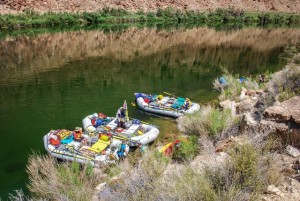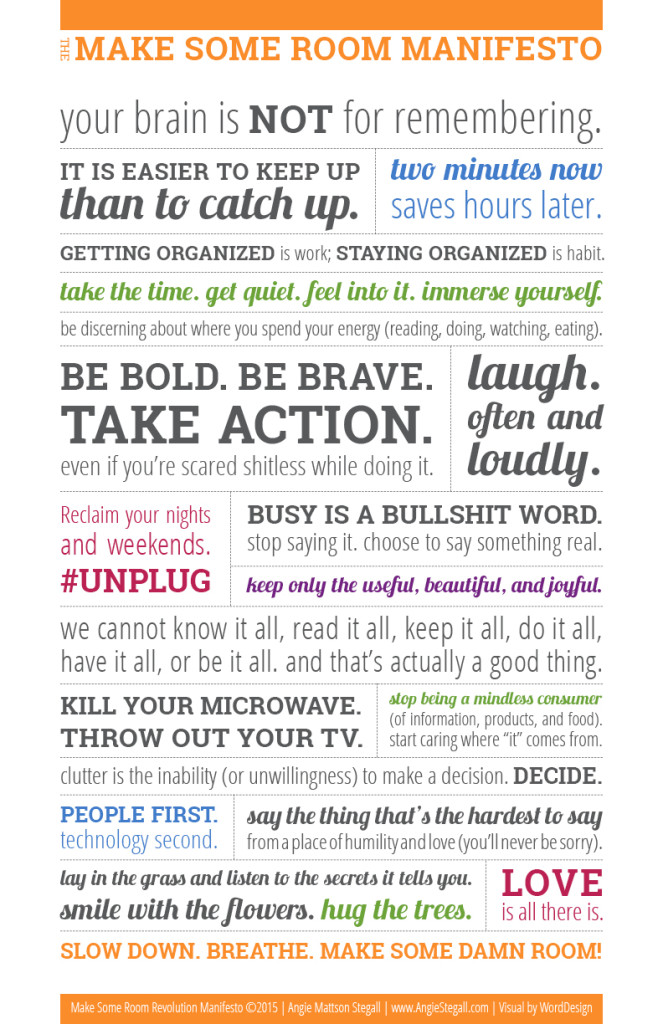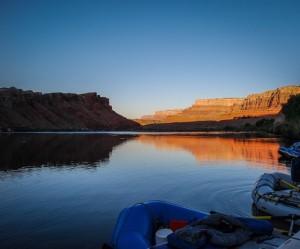It is easier to keep up than to catch up.
Admittedly, the part of my Grand Canyon trip that I found least appealing was packing and unpacking the boats each day. The set up and tear down routines took time, effort, and coordination. Especially at the beginning of the trip, I struggled to carry heavy items through the sand, and sometimes up sandy hills, for them to be set up. Kitchen areas, bathroom areas, and our chosen sleeping areas required the most effort because of the sheer volume of items to load and unload.
But, the more organized and cooperative we were during unloading and set up each evening, the faster we found the whole routine got done. Each morning when we packed up, the more methodical and consistent we were, the faster we were able to finish and get going down the river.
I can only imagine how things might have gone if our group was sloppy about organization. Consequences could have ranged from annoying (where did we put the hand wash stations this time?) to severe (a boat flips in a rapid and stuff not tied down is lost to the river).
We also found it easier and more courteous to complete tasks all the way rather than leaving something for the next meal or the next day. Just think – if we’d left dirty dishes for the evening crew, not only would dinner be delayed, but we’d potentially open ourselves us to bacteria and illness which could have jeopardized the whole group. Plus, leaving dirty dishes is just rude – I mean, how cranky would that have made the team?
Another area where we focused on being thorough was keeping up with the trash, including the tiny particles of food and other debris called “micro-trash.” Although the National Park Service limits the number of trips and people allowed on the Canyon at any one time, there’s still incredible pressure on the environment from those who do float the river.
 Campsites are used almost daily throughout the warmer months. And with 16 people eating and sleeping and coming and going, trash is bound to happen. One of the very last things you are required to do is scan your camping area for microtrash. If you see any bit trash (whether it’s yours or not), you pick it up. It doesn’t even matter how small (think cigarette butts, dental floss, twist ties, and other bits of paper and plastic). By keeping up with the microtrash, you avoid having to organize a big clean up later on. And you protect the animals, the camping area, the water – heck, the whole Grand Canyon environment – from becoming a big trash can.
Campsites are used almost daily throughout the warmer months. And with 16 people eating and sleeping and coming and going, trash is bound to happen. One of the very last things you are required to do is scan your camping area for microtrash. If you see any bit trash (whether it’s yours or not), you pick it up. It doesn’t even matter how small (think cigarette butts, dental floss, twist ties, and other bits of paper and plastic). By keeping up with the microtrash, you avoid having to organize a big clean up later on. And you protect the animals, the camping area, the water – heck, the whole Grand Canyon environment – from becoming a big trash can.
Another way we kept up was through putting things back where we found them, and sticking to routines for set up, cooking, cleaning, and tear down. Keeping to these small routines helped us “keep up” with our communal stuff, personal stuff, and with each other.
Beyond the Canyon
I think my sister was the first person I ever heard say, “It is easier to keep up than to catch up.”
I’m pretty sure it’s not her original saying, yet it is good advice. And it’s advice I share often now because it applies to so many different areas of our lives:
- Losing weight
- Getting organized
- Using technology
- Doing the dishes
- Taking out the garbage
- Sleeping
- Working
- Exercising
- Traveling
- Starting anything
- Quitting anything
I also love “it is easier to keep up than catch up” because it asks me to focus on the essentials. I can’t keep up with everything – I simply don’t have enough time, energy or attention. If I keep running out of time, or energy, or attention, I’ll be always trying to catch up. See how this works?
Rather, when I focus on the essentials, when I focus on doing less, I know I’ll be able to more effectively keep up – and quit playing that losing game of “catch up.”
Let me share a more common, real-world example that you might be able to relate to:
You get mail, right? And a bunch of it, I’d bet. See if any of the follow scenarios rings a bell for you:
Scenario #1 – The Avoider: You go out to the mailbox and see a big stack. You shut the box and walk away.
“Too overwhelming,” you think.
Scenario #2 – The Pile Maker: You pull the big stack of mail out of the mailbox, walk into the kitchen and drop it on the counter.
“I’ll get to it later,” you sigh. And off you go to the next thing on your mind.
Scenario #3 –The Distracted One: You take the big stack of mail and flip through it. Some is obviously junk mail, so you chuck it in the trash. A few things need action and you stick them back on the counter. Some stuff might need to be shredded. You create another pile and think, “I’m hungry. What’s for dinner?” as you head to the fridge.
Scenario #4 – The One Who Gets It Done: In just under two minutes, you retrieve the mail from the mailbox and walk inside to your desk. You plow through the pile with determination and focus. Bills to be paid go on the desk in the same spot every time. Junk mail goes in the trash. Unwanted papers and circulars go in the recycle bin. The shredder is right next to the trash, so you shred the few information-sensitive pages. You make a note about something and put it with the bills. Magazines to be read go on the table by the reading lamp. Done. No new piles are created because everything has a place to go.
Which example sounds like you?
Which example do you wish was you?
Keeping Up
It’s easier to keep up with recurring events (like the mail, which – in the United States anyway – comes six out of seven days, rain or shine) than to try catch up when the stack is three feet tall and feels overwhelming.
The same argument can be made for email, filing papers, returning phone calls, returning something “back to its place”, or even flossing your teeth (as an aside – my friend Beverly says you only have to floss the ones you want to keep).
So, how can YOU keep up?
Ways Make Some Room
I say learn to adopt and love routines!
Go back and read #4 in the mail scenario above. One routine is to become the One Who Gets It Done.
Create a routine for anything. Here are the steps:
- Decide what needs to be done
- Commit to it (daily, weekly, monthly, yearly)
- Gather the supplies you need (if any)
- Carve out and dedicate the time (even if it’s two minutes once a day)
- Do the thing
- Give yourself a Big High-Five!
Whether you’re in a sensitive eco-system like Grand Canyon or a familiar place like your home or office, believe me when I tell you keeping up is so much easier (and efficiently effective) than catching up. Use the steps above to establish your routine. Even if you miss a day, it’s so much easier to get back to the habit and keep up with it.
I will say, when we returned from our Grand Canyon trip, we had quite a huge pile of mail (and quite a backlog of email). And that’s perfectly normal whenever you have a disruption in your normal routine. The key to getting back into your routine is catching up by handling the backlog as efficiently and effectively as you can. Schedule time to dig in and clear out the backlog. Be ruthless about tossing, recycling, and shredding. With email, be “delete-key-happy” and just give yourself permission not to read anything isn’t an “actionable item.” We get a lot of information pushed at us these days. Most of it is just an opportunity to help us part with our money. Resist the temptation to “take a peek” so you can more quickly get back to what’s truly important.
It is easier to keep up than to catch up!
Did you miss the Introduction or Chapter One (Your brain is not for remembering)?
Also, stay tuned for Chapter Three (Two minutes now saves hours later) next week!
 [All content and photos are (c) 2016 Angela Mattson Stegall and Nelson Stegall for the book, Make Some Room: Powerful Life Lessons Inspired by an Epic 16-day Colorado River Rafting Trip Through Grand Canyon.The book will be available mid-June through Amazon.com in paperback and Kindle formats.]
[All content and photos are (c) 2016 Angela Mattson Stegall and Nelson Stegall for the book, Make Some Room: Powerful Life Lessons Inspired by an Epic 16-day Colorado River Rafting Trip Through Grand Canyon.The book will be available mid-June through Amazon.com in paperback and Kindle formats.]

